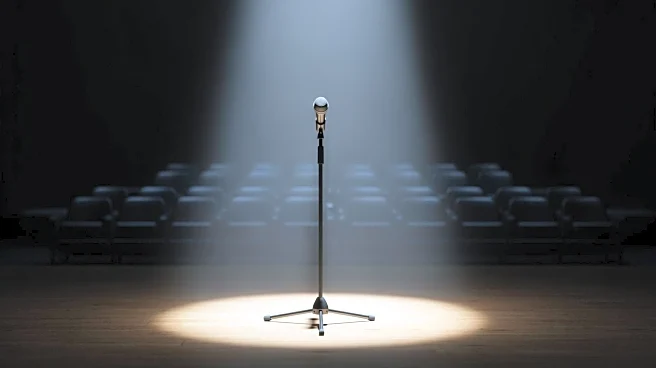What's Happening?
Bad Bunny, the popular Puerto Rican artist, chose not to stand during the performance of 'God Bless America' at a Yankees game, drawing attention and sparking discussions. The incident occurred during Game
3 of the American League Division Series, where Bad Bunny was present as a spectator. Laurence Leavy, known as 'Marlins Man,' noted the singer's decision and engaged with his entourage, who explained that Bad Bunny was upset over criticisms from President Trump and others regarding his upcoming Super Bowl halftime performance. The criticisms stem from his songs being primarily in Spanish, with some suggesting a replacement with an American country singer. Bad Bunny's decision not to stand was intentional, as he expressed his right not to do so, despite being advised that it might attract negative attention.
Why It's Important?
The incident highlights ongoing cultural and political tensions in the U.S., particularly regarding representation and inclusivity in major events like the Super Bowl. Bad Bunny's choice reflects broader issues of identity and belonging, especially for Puerto Rican artists who are U.S. citizens but often face discrimination. The debate over his Super Bowl performance underscores the challenges faced by non-English speaking artists in gaining acceptance in mainstream American culture. This situation also illustrates the intersection of sports, politics, and entertainment, where actions taken by public figures can have significant cultural implications.
What's Next?
Bad Bunny's decision may lead to further discussions about cultural representation in American sports and entertainment. As the Super Bowl approaches, there may be increased scrutiny and debate over the choice of performers, potentially influencing future decisions by event organizers. Additionally, Bad Bunny's stance could inspire other artists to express their views on political and cultural issues, potentially leading to more diverse representation in high-profile events.
Beyond the Headlines
The incident raises questions about the role of artists in political discourse and their ability to influence public opinion. Bad Bunny's actions could be seen as a form of protest, highlighting the importance of freedom of expression and the right to dissent. This event may also contribute to ongoing discussions about the status of Puerto Rico and its citizens, emphasizing the need for greater awareness and understanding of their unique position within the U.S.









